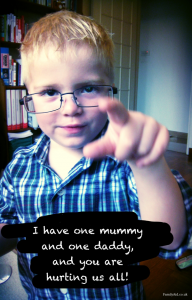BabyCenter Guest Blogger
posted in Pregnancy
By Laura Dewire
One in four women will lose a child at some point during pregnancy. In many cases, the child is lost to families who already have other children. Those siblings have developed their own hopes and aspirations for their sister or brother. They dream of what their sibling will look like, act like, be like. They prepare a space in their hearts for that new baby, and when the baby is lost, that space needs to be nurtured and loved.
Nothing is more sacred than the innocence of a child. Children are wildly curious and vastly compassionate, and they have an unfathomable capacity for grace and love. Children are resilient and fragile all at the same time. That’s why discussing tragic events with little ones can be so difficult — and why it’s so important during Pregnancy and Infant Loss Awareness Month to recognize the impact of child loss on the entire family.

Losing a child leaves a hole in everyone’s heart, but it’s imperative that when dealing with infant loss, we take the time to recognize that children, like adults, have their own way of processing grief that requires tactful, compassionate care. As a teacher of first and second grade, I’ve learned a lot from my students about how to care for a child who is hurting. Here are the best practices I’ve found for helping a grieving child:

- Be an active listener. Allow the child to feel a full range of emotions — sometimes all at the same time. Be the listener you would need if you were hurting or upset. It’s so important not to underestimate or overstate exactly what a child is feeling.
- Be flexible. When a child’s life is interrupted by pain, the child will react in a way that represents that sudden change. There will be days when everything goes according to plan, and there will be days when you feel lucky to have made it out with all your hair still attached. Remaining flexible and staying positive are imperative.
- Promote open, honest discussion. Create an environment where everyone feels like his or her voice is heard. Sometimes it’s easy to think that children are too young to understand grief or tragedy, but that’s not the case. Even young children take on the load of grief, and they can tell when others around them are sad.
- Encourage the child to share. Children who have lost siblings often internalize their pain because they are afraid of hurting other members of their family. They don’t want to upset Mommy or Daddy, so they keep their feelings to themselves. Encourage them to share, but don’t push them. Children will share when they are ready, as long as they feel safe to do so.
- Simply be there. Sometimes, words fail when a child is hurting. But reminding that child how much he or she is loved can make a huge difference.
 Laura Dewire is the author of A Corner of Heaven, a book for children coping with the loss of a baby sibling. A Wisconsin native, Laura now lives near Cincinnati, Ohio, where she enjoys teaching, practicing yoga, and cooking. A portion of the proceeds from A Corner of Heaven will benefit Now I Lay Me Down to Sleep, which provides bereavement photography to grieving families.
Laura Dewire is the author of A Corner of Heaven, a book for children coping with the loss of a baby sibling. A Wisconsin native, Laura now lives near Cincinnati, Ohio, where she enjoys teaching, practicing yoga, and cooking. A portion of the proceeds from A Corner of Heaven will benefit Now I Lay Me Down to Sleep, which provides bereavement photography to grieving families.
































